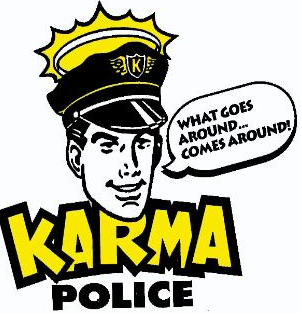Unh-unh. It’s not fate. It’s not destiny. Rather, Karma is just the opposite: the simple, eternal law that your present thoughts, choices and actions determine (y)our future. But I’ll let the experts weigh in:
“Such is the moral construction of the world that no national crime passes unpunished in the long run… Were present oppressors to reflect on the same truth, they would spare to their own countries the penalties on their present wrongs which will be inflicted on them in future times. The seeds of hatred and revenge which they [sow] with a large hand will not fail to produce their fruits in time. Like their brother robbers on the highway, they suppose the escape of the moment a final escape and deem infamy and future risk countervailed by present gain.”
– Thomas Jefferson, American Founding Father and U.S. president (1743-1826), letter to Francois de Marbois, 1817.
‘Karma, ahhh. We sow what we reap… We reap what we sow! We reap what
we sow. The law of cause and effect. And we are all under this law.”
– Nina Hagen
And that last is the literal definition. Karma means action, and is fundamentally no more good nor bad than is gravity. If gravity hits you over the head with an anvil, you say it’s tragic, it’s awful. If gravity brings the cooling rain down upon your crops, you say it is a blessing. It’s neither here nor there, and it’s both.
“We are here to awaken from the illusion of our separateness.”
– Thich Nhat Hanh, French-based Vietnamese Buddhist monk, peace activist and author (b. 1926)
It’s the law of interdependence—that every action produces a reaction, and that when you combine billions of actions with billions of reactions, and they begin to react to one another’s reactions…well that’s why it’s not as simple as if you do good, good things come back to you. Or if you do bad, that bad things will happen to you. Why? Because your karma could, boomeranging back toward you, come into contact with other streams of karma, either good or bad.
But if you want to keep things simple, live by these words:
“If you want to be happy, think of others. If you want to be unhappy, think only of oneself.” It’s the Buddhist version of Christianity’s Golden Rule: Do Unto Others as you would have Others Do Unto You.
We all know wonderful, cheerful, heartfelt people who delight in life, who consistently (though not allllways) bring out the best in others, whether friends or strangers. And everyone loves ’em right back.
“Act so as to elicit the best in others and thereby in thyself.”
– Felix Adler, American educator and reformer (1851-1933)
So live your life with the glass half full, and even if you lose out, and fail, and cry, and get depressed, and wonder how to go forward, and feel alone, and feel self-pity, you’ll remember:
“When you lose, do not lose the lesson.”
~ Dalai Lama.“Karma is not just about the troubles, but also about surmounting them.”
– Rick Springfield
And that’s why we here at elephantjournaldotcom focus on three often disconnected arenas: (non-new agey) spirituality, daily environmentalism and political action. Because once you get the idea that taking responsibility for your every action, your every dollar spent is a good thing…well you become an environmentalist (naturally!), and you become vested in making positive, non-aggressive political change (whether locally or nationally, or internationally). And, thirdly, you always come back to where karma begins: in your mind:
“Since wars begin in the minds of men, it is in the minds of men that the defenses of peace must be constructed.” ~ UN Charter.
For more Karma quotes, click here.
Brutally honest sign:



Read 15 comments and reply